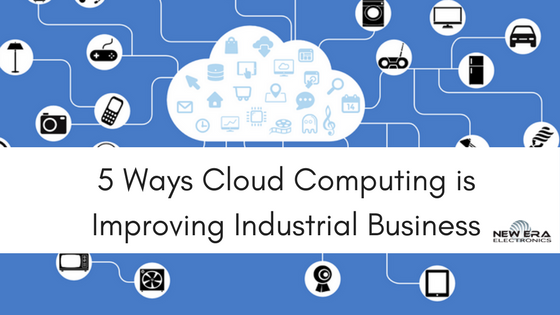
5 Ways Cloud Computing is Improving Industrial Business
Blog
 With the emergence of new players in most industrial sectors of the market, many companies need to find ways to remain competitive. One of the logical ways to maintain an edge over the competition is to harness new technology.
With the emergence of new players in most industrial sectors of the market, many companies need to find ways to remain competitive. One of the logical ways to maintain an edge over the competition is to harness new technology.
The cloud is seen as a cost effective way to manage data and run workflows that assist with the administration of a business. Cloud computing in industrial sectors is growing exponentially and adding efficiency to so many businesses.
Manufacturing
There are several ways that cloud computing is making an impact on manufacturing:
- Quality control. Every sector of the manufacturing industry has product standards that need to be implemented. Some of these are determined by industry legislation and others are driven by end user quality expectations. Quality compliance is often necessary at each stage of a manufacturing process to ensure the end product conforms to specifications. Cloud-based manufacturing systems that facilitate real-time data collation and analysis make it possible for timely solution of problems in production. Plant management and operators are able to respond to situations and take proactive measures when necessary. Cloud computing provides greater and more immediate analytics as well as increased reporting accuracy. The high computing power of cloud platforms facilitates tracking an individual product’s manufacturing history to determine the cause of defects.
- Delivery time. Cloud computing enables timely notification of any delays in the manufacturing process and ensures steps are taken to meet delivery schedules. The enhanced power of cloud-based enterprise resource planning (ERP) improves the accuracy of order processing. Cloud collaboration allows companies to have a faster turnaround on product development.
- Logistics management. Cloud-based industrial computing systems can process and organize data more efficiently than traditional computers. This enables companies to easily track and manage their entire supply chain from receipt of raw materials through production, warehousing and delivery to customer.
- Process control. The cost and space saving benefits of cloud computing are recognized by many manufacturers. The ideal situation would be to pay only for cloud-based process control technology relevant to a particular process, without shouldering the cost of hardware. However, the main concerns are reliability and the risks associated with production loss and plant safety. At present, cloud computing is used to collect large amounts of data to analyze and understand unforeseen events, and to facilitate predictive modeling and virtual engineering.
Construction
Cloud computing has strong appeal for the construction industry. Company construction sites are often scattered and change constantly. Meanwhile, there is no room for computer hardware on job sites, so access to the cloud through rugged handheld devices is essential. It makes sense that workers have ready access to enterprise information and workflows in all locations. Using the cloud, they can have better access to the internet and any company intranet remotely from mobile devices while working on the job.
The cloud provides access to information at any time and at any place around the globe. Workers on site can relay information to support preparing bills of quantities for progress payments, financial reports and payrolls. Offsite managers have real-time knowledge of onsite events and construction progress. They can participate in problem solving and decision making when necessary to move jobs along and speed up construction.
Cloud computing also speeds up time to completion by expanding the team beyond the traditional in-house crew. It enables much closer collaboration between contractors, sub-contractors and suppliers which is critical in delivering projects on time and within budget.
Professional Services
Even though they don’t have physical products, professional service providers have much to gain from harnessing the power of cloud computing to improve the efficiency of their businesses. Companies offering IT support, legal advice, accounting services and financial advice are using the cloud to streamline their processes and improve customer relations:
- Accounting. The cloud is being used to consolidate the process of collating, reviewing and processing invoices. Many employees work remotely at client premises. The cloud enables them to submit time sheets and expenses with ease.
- Data security. Service providers working with sensitive client data need to ensure information is secure. Any breach or loss caused by hardware or software malfunction can have serious legal and financial ramifications. Companies use cloud computing to ensure data is safely stored and backed up.
- Collaboration. Cloud computing makes information more accessible. Professional service enterprises use the cloud to foster easier collaboration between internal team members and clients.
Retail
The changing face of the retail industry has almost made the concept of a ‘convenience store’ obsolete. Retailers are now expected to extend their hours of business to accommodate the demands of their markets. This has necessitated access to information by management who cannot be physically present throughout the working day.
Retailers are using cloud computing to effect tighter supply chain management. The cloud provides total visibility to facilitate effective management of inventory, expedite deliveries, and to solve problems with stock shortages. Real-time inventory information helps both retailer and supplier to limit stock holding on site but also potentially eliminate the occurrence of stock-outs.
Cloud technology is fully scalable. As sales volumes increase, retailers won’t have to bear the costs of hardware or software upgrades. They also won’t have the cost of maintaining expensive systems in quieter trading periods.
Competition for business in the retail industry is fierce and has given rise to innovative loyalty programs. Retailers are using cloud computing to manage the huge amount of customer data and the allocation of loyalty points.
Enterprise Franchising
Many enterprises today are leveraging the success of their business models through franchising. They are using cloud computing in their industries to improve accessibility to operating standards and procedures that are so vital to ensure the uniformity of the business model.
Franchises are securing their data in the event of on-site disaster or hardware malfunction. Using the cloud even fosters collaboration among franchisees, building community spirit, helping to share ideas, and assisting with problem solving.
Cloud computing in these industries above is providing great benefits. But they represent the tip of the iceberg. Cloud computing platforms are envisaged to be the norm for use in most industries in the near future.
Do you see the overwhelming benefit of cloud computing for your business? If so, contact a leading developer of custom computer solutions to assist with the process of moving to the cloud.
Creative Commons Attribution: Permission is granted to repost this article in its entirety with credit to New Era Electronics and a clickable link back to this page.




